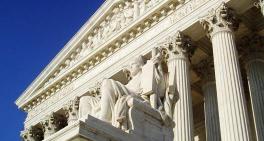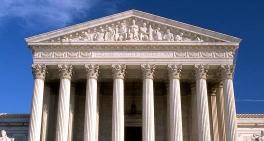Question of sales tax on online purchases goes to high court
Court Watch
Online shoppers have gotten used to seeing that line on checkout screens before they click "purchase." But a case before the Supreme Court could change that.
At issue is a rule stemming from two, decades-old Supreme Court cases: If a business is shipping to a state where it doesn't have an office, warehouse or other physical presence, it doesn't have to collect the state's sales tax.
That means large retailers such as Apple, Macy's, Target and Walmart, which have brick-and-mortar stores nationwide, generally collect sales tax from customers who buy from them online. But other online sellers, from 1-800 Contacts to home goods site Wayfair, can often sidestep charging the tax.
More than 40 states are asking the Supreme Court to reconsider that rule in a case being argued Tuesday. They say they're losing out on "billions of dollars in tax revenue each year, requiring cuts to critical government programs" and that their losses compound as online shopping grows. But small businesses that sell online say the complexity and expense of collecting taxes nationwide could drive them out of business.
Large retailers want all businesses to "be playing by the same set of rules," said Deborah White, the president of the litigation arm of the Retail Industry Leaders Association, which represents more than 70 of America's largest retailers.
For years, the issue of whether out-of-state sellers should collect sales tax had to do mostly with one company: Amazon.com. The online giant is said to account for more than 40 percent of U.S. online retail sales. But as Amazon has grown, dotting the country with warehouses, it has had to charge sales tax in more and more places.
President Donald Trump has slammed the company, accusing it of paying "little or no taxes" to state and local governments. But since 2017, Amazon has been collecting sales tax in every state that charges it. Third-party sellers that use Amazon to sell products make their own tax collection decisions, however.
The case now before the Supreme Court could affect those third-party Amazon sellers and many other sellers that don't collect taxes in all states — sellers such as jewelry website Blue Nile, pet products site Chewy.com, clothing retailer L.L. Bean, electronics retailer Newegg and internet retailer Overstock.com. Sellers on eBay and Etsy, which provide platforms for smaller sellers, also don't collect sales tax nationwide.
States generally require consumers who weren't charged sales tax on a purchase to pay it themselves, often through self-reporting on their income tax returns. But states have found that only about 1 percent to 2 percent actually pay.
Related listings
-
US jury acquits Peruvian defendant in FIFA bribery case
Court Watch 12/26/2017A former South American soccer official was acquitted Tuesday of a corruption charge stemming from the FIFA bribery scandal after two others were convicted last week, capping a trial in which U.S. prosecutors sought to expose a culture of greed and c...
-
The Latest: Senate panel approves tax overhaul bill
Court Watch 11/20/2017Vice President Mike Pence says "now the ball is in the Senate's court," after the House voted Thursday to approve a $1.5 trillion overhaul of the nation's tax code.At the Tax Foundation's 80th annual dinner in Washington, Pence said, "The next few we...
-
Kenya court set to hear petitions challenging repeat vote
Court Watch 11/14/2017Kenya's Supreme Court is poised to hear petitions challenging President Uhuru Kenyatta's re-election in a repeat presidential poll.The court made history when it nullified Kenyatta's re-election in August. It cited irregularities and illegalities in ...




